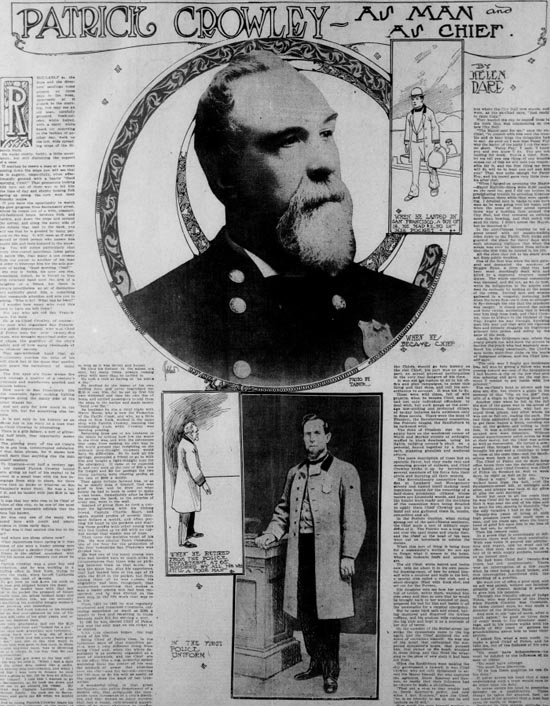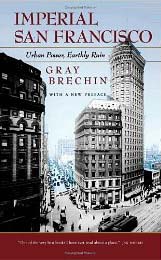VIPS in the Port of San Francisco

Patrick Crowley
March 4, 1906, San Francisco Call, San Francisco, California
More than a century ago a boy named Patrick Crowley landed here, giving up half of his capital to be rowed in a small boat with his few belongings from ship to shore, for there were no docks or wharves on San Francisco's water front. He was a boy of 18, and he landed with just $2.50 in his pocket . . .
Boatman Patrick Crowley
He set up his own line of boats and carried passengers to and from the ships in the harbor and made money "hand over fist."
As boatman he ran a rival trade with Harry Morse, who is now the Pinkerton of the Pacific Coast, and who, as a little chap in New York, worked in the same shop with Patrick Crowley, learning the bookbinding trade while Crowley was learning printing.
Returning from one of his ventures to the mines he noticed how low the water in the river was, and with the astuteness that came from making his own way in the world guessed that freighting on the ordinary deep-draught steamers would have its difficulities. So he took all his savings, persuaded a friend to go in with him and bought a light-draught boat for the emergency. It came as he expected it, and very soon at the rate of $100 a ton for freight and $29 for passage the two young partners were clearing profits at the rate of $3000 a month . . .
October 11, 1864, Daily Alta California, San Francisco, California, U.S.A.
The Loyal Irish League
At the late meeting of loyal Irishmen at Platt's Hall, the following named officers were elected: President: M. B. Hughes, Vice Presidents: Michael Kenny, M. Fennell, John Mulholland, Patrick Crowley, J. S. Kennedy, Michael O'Brien. C. D. Carter. Hon. Hugh Farley, Robert Cushing, John P. Buckley, M. Miles, James Donovan, Jos. Holland, Cornelius O'Connor, C. P. Duane, Geo. L. Kenny, P. J. Donoghue. D. J. Murphy, J. W. Bingham, John A. McGlynn, Wm. Ingram, Capt J. W. Wilkinson, Mr. O'Hanlon, John Roberts, J. Winters. Jno. H. O'Brien. W. W. Haney Jno. P. Gallagher, Eugene M. Casey, Edward Gallagher, M. T. Roach W. J. Hogan, Thos. O'Brien, Wm. Martin, Matthew Mclntyre. Recording Secretary: J. Crowley. Corresponding Secretary: F. O'Bryne. Treasurer: M. Kenny. Finance Committee: John A. McGlynn. P. B Quinlan and 0. P. Duane.
Chief of Police in San Francisco.

August 16, 1875, Sacramento Daily Union, Sacramento, California, U.S.A.
A FIRST RATE NOMINATION.
The Democracy of San Francisco have made one first-rate nomination, in the person of Patrick Crowley, for Chief of Police. Mr. Crowley served two terms in the office, and at no time during the history of the city was the police force so well governed, the security of life and property so complete, or tbe force so free from the political corruption and entanglement which have since demoralized and deprived it of half its value. We do not know that any charge was ever brought against Chief Crowley. He was by far the most popular man who ever held that important and responsible office, and he was zealous to a fault in the performance of his duty. If tried and proved merit and unblemished integrity are recommendations of any weight with the voters of San Francisco, then ought Patiick Crowley to be the next Chief ot Police, and by the largest vote cast lor any officer in the manicipal government.
March 2, 1896, Sacramento Daily Union, Sacramento, California, U.S.A.
Chief Crowley Resigns.
SAN FRANCISCO, March 1. Chief of Police Crowley has handed in his resignation to the Police Commissioners. Chief Crowley has been at the head of the police for twenty-three years, and resigns on account of failing health.
LEES WILL SUCCEED CROWLEY
SAN FRANCISCO, March 1.
Captain I. W. Lees is to succeed Patrick Crowley, who resigned as Chief of Police last Saturday, and John Seymour is to become the head of the detective department in Lees' place. That is the forecast given out everywhere the matter is discussed, and especially in police circles. Chief Crowley has recommended Lees to the Police Commissioners as his successor.
The Irish Way: Becoming American in the Multiethnic City (Penguin History of American Life)
A lively, street-level history of turn-of-the-century urban life explores the Americanizing influence of the Irish on successive waves of migrants to America's cities.
James R. Barrett
In this award-winning Penguin History of American Life series, James R. Barrett chronicles how a new urban American identity was forged in the streets, saloons, churches, and workplaces of the American city. This process of “Americanization from the bottom up” was deeply shaped by the Irish. From Lower Manhattan to the South Side of Chicago to Boston’s North End, newer waves of immigrants and African Americans found it nearly impossible to avoid the Irish. While historians have emphasized the role of settlement houses and other mainstream institutions in Americanizing immigrants, Barrett makes the original case that the culture absorbed by newcomers upon reaching American shores had a distinctly Hibernian cast.
By 1900, there were more people of Irish descent in New York City than in Dublin; more in the United States than in all of Ireland.
Barrett reveals how the Irish vacillated between a progressive and idealistic impulse toward their fellow immigrants and a parochial defensiveness stemming from the hostility earlier generations had faced upon their own arrival in America. They imparted racist attitudes toward African Americans; they established ethnic “deadlines” across city neighborhoods; they drove other immigrants from docks, factories, and labor unions. Yet the social teachings of the Catholic Church, a sense of solidarity with the oppressed, and dark memories of poverty and violence in both Ireland and America ushered in a wave of progressive political activism that eventually embraced other immigrants. Drawing on contemporary sociological studies and diaries, newspaper accounts, and Irish American literature.
The Irish Race: In California, and On The Pacific Coast (1878)
Hugh Quigley
The Irish Americans
A History
Jay P. Dolan of Notre Dame University is one of America’s most acclaimed scholars of immigration and ethnic history. Although more than 30 million Americans claim Irish ancestry, no other general account of Irish American history has been published since the 1960s. Dolan draws on his own original research and much other recent scholarship to weave an insightful, colorful narrative. He follows the Irish from their first arrival in the American colonies through the bleak days of the potato famine that brought millions of starving immigrants; the trials of ethnic prejudice and "No Irish Need Apply;" the rise of Irish political power and the heyday of Tammany politics.
The Cross and the Shamrock Or, How To Defend The Faith. An Irish-American Catholic Tale Of Real Life, Descriptive Of The Temptations, Sufferings, Trials ... And Female Servants Of The United States.
Hugh Quigley
Written in the mid-1800s.
Irish Californians: Historic, Benevolent, Romantic
Patrick Dowling has written a collection of brief biographies of Irish immigrants that he found admirable. Published when Patrick was 94, this book contains his personal choices of Irish heroes, entrepreneurs, and colorful characters, arranging from Timothy Murphy, who came to California before the American conquest, to Thomas Sweeny, who tried to invade Canada, to Eleanor Martin, who was the doyenne of San Francisco high society. Index and bibliography. 120 illustrations.
How the Irish Saved Civilization
The Untold Story of Ireland's Heroic Role From the Fall of Rome to the Rise of Medieval Europe
(The Hinges of History)
Thomas Cahill
In this entertaining and compelling narrative, Thomas Cahill tells the story of how Europe evolved from the classical age of Rome to the medieval era. Without Ireland, the transition could not have taken place. Not only did Irish monks and scribes maintain the very record of Western civilization -- copying manuscripts of Greek and Latin writers, both pagan and Christian, while libraries and learning on the continent were forever lost -- they brought their uniquely Irish world-view to the task.

 AncestryDNA: Genetic Testing
AncestryDNA: Genetic Testing
This service combines advanced DNA science with the world's largest online family history resource to predict your genetic ethnicity and help you find new family connections. It maps ethnicity going back multiple generations and provides insight into such possibilities as: what region of Europe are my ancestors from, or am I likely to have East Asian heritage? AncestryDNA can also help identify relationships with unknown relatives through a dynamic list of possible DNA member matches.













 Copyright ~ 1998-2018.
Copyright ~ 1998-2018. 